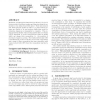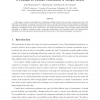682 search results - page 74 / 137 » Autonomous Environment and Task Adaptation for Robotic Agent... |
ICRA
2002
IEEE
14 years 1 months ago
2002
IEEE
Dynamical systems theory is used here as a theoretical language and tool to design a distributed control archictecture that generates navigation in formation, integrated with obst...
ICRA
2006
IEEE
14 years 3 months ago
2006
IEEE
— Many application tasks require the cooperation of two or more robots. Humans are good at cooperation in shared workspaces, because they anticipate and adapt to the intentions a...
GECCO
2009
Springer
14 years 3 months ago
2009
Springer
Evolution of multi-agent teams has been shown to be an effective method of solving complex problems involving the exploration of an unknown problem space. These autonomous and het...
CW
2003
IEEE
14 years 2 months ago
2003
IEEE
This study concerns virtual environments for training in operational conditions. The principal developed idea is that these environments are heterogeneous and open multi-agent sys...
AROBOTS
2004
13 years 8 months ago
2004
In this paper, we present a paradigm for coordinating multiple robots in the execution of cooperative tasks. The basic idea in the paper is to assign to each robot in the team, a ...


